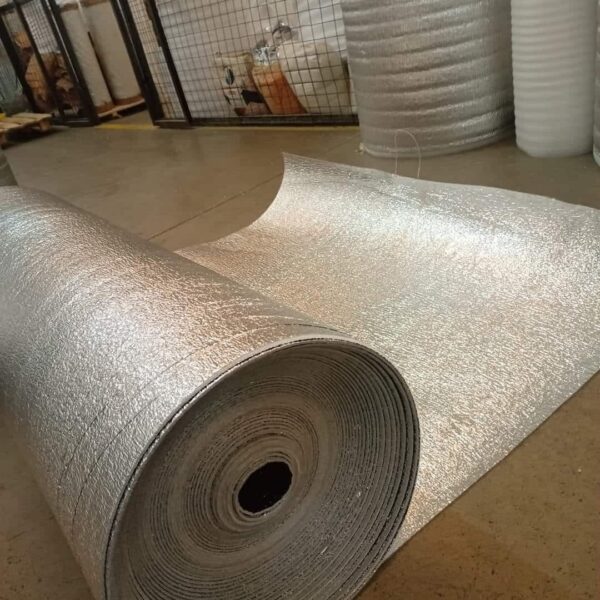Along Kiambu Road, Next to Total Edenville Petrol Station.
Email: Sales@advancedbuilders.co.ke
Call: 0701 63 66 62
Along Kiambu Road, Next to Total Edenville Petrol Station.
Email: Sales@advancedbuilders.co.ke
Call: 0701 63 66 62
KSh14,000.00
Carrier information
Payment methods
Unlimited help desk
Track or off orders
| Dimensions | 40000 × 1500 × 3 mm |
|---|
Roof Heat Insulation
Benefits of Roof Insulation
Super Heavy Duty (10 mm)
Super Heavy Duty Roof Insulation ranks the best and ideal heat insulation material that can withstand high temperatures. It’s a double-sided reflective foil insulation, with a 10 mm thick 100% closed-cell polyethylene foam core, that provides the benefits of radiant barrier, reflective insulation and a moisture barrier. Best applicable in the pitch roof, flat roof, wall insulation, drywall partitions, pipes, ducts, studio soundproofing, home theaters etc.
Heavy Duty ( 5 mm)
Heavy Duty Roof Insulation is double-sided reflective foil insulation, with a 5 mm thick polyethylene foam core, that provides a radiant barrier, reflective insulation and a moisture barrier. It protects your roof space from heat build-up due to radiant heat penetration by acting as a heat barrier to protect all services within the roof space from drying out, cracking and degradation due to solar heat gain. It is a cost-effective insulation that is suitable for use in metal deck roofing system in residential, commercial, industrial and horticultural buildings where temperature variations are moderately/relatively high and where there is a need to reduce the disturbing rain noise.
Regular (2 mm)
Regular Roof Insulation is light duty double-sided reflective foil insulation, with a 2 mm thick polyethylene foam core that provides a radiant insulation, a conduction barrier and a moisture barrier. It is cost-effective insulation that is suitable for use under timber and metal trusses in residential and commercial buildings where temperature variation or heat level is minimal or where ceilings are in use.
Roof Insulation Installation Guide
Installation Guide for a New Roof:
1. Attach the galvanised wires onto the trusses running parallel to the purlins. The galvanised wires should be 300 mm apart.
2. Place the roof insulation on top of the galvanised wires ensuring that the ends of the sheets are held firmly and that the sheets run continuously from one end of the truss to the other.
3. When adjoining the next roll, make sure that 100 mm overlaps the first roll. This should ensure that the product is creating a vapour barrier.
4. Where necessary cut it around any penetrations making sure a tight fit to minimize openings.
Installation Guide for an Existing Roof:
1. Place the roof insulation between the purlin and the galvanised steel strip and screw it onto the purlins using 1 inch self tapping steel screws.
2. When fixing the roof insulation onto the subsequent purlin, pull the sheet so as to achieve a tight and firm fit free of sagging.
3. When adjoining the next roll, make sure that 100 mm overlaps the first roll. This should ensure that the product is creating a vapour barrier.
4. Where necessary cut it around any penetrations making sure a tight fit to minimize openings.
No account yet?
Create an Account